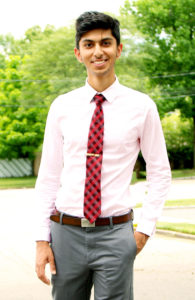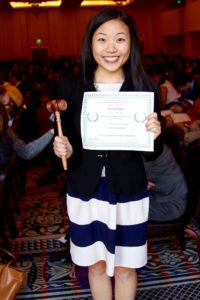
Co Secretary-General of JP Stevens’ MUN Team, Ayush Saxena (Interviewer)

Secretary-General of TJ’s MUN Team, Laura Chu (Interviewee)
About a month ago, at ILMUNC, I was given the chance to meet the Secretary-General of one the most immense powerhouses when it comes to high school Model UN. After seeing and hearing about Thomas Jefferson High School for Science and Technology (TJHSST), I was truly impressed by the level of skill maintained across the legions of delegates it brings. A couple weeks after the conference, I was able to conduct an interview with the program’s Secretary-General, Laura Chu.
Can you describe your meeting schedule?
Yeah! We have officer meetings every Wednesday and general meetings every Friday. During these, we usually focus on conference preparation. As a conference approaches, we often host work sessions dedicated to writing and editing position papers. Otherwise, some of the topics we specifically focus on include: unmoderated caucuses, bloc forming, leading in general, question & answer sessions, and speaking. Due to the size of the club, we also break out into smaller groups led by officers to focus on specific areas. We also split up based on committee type, so that General Assembly delegates are in one room and Crisis Delegates are in another.
Although we do a lot of work during after school meetings, the most important facet of our training is our lunch sessions. Our sponsor allows us to use her room for novice and pre-conference training, and this is when delegates can get more individual questions answered.
How does training for GA’s versus Crises differ?
Well, we usually have more structured training for GA delegates. This means a more concrete strategy that we want them to follow, at least in the beginning of their MUN career. In the crisis room, we encourage our delegates to craft their own strategy. We allow them to choose their path, but we aren’t any easier on them in terms of performance.
How do you select delegates for national conferences?
I think we’re different from most schools in how we handle this because we don’t have a set college conference roster. We have an application process for each conference – it’s a Google form in which delegates can select any position they’d be interested in. We get around 300 applications per conference, and have to narrow it down to 100 at maximum. When looking at each application, we consider the balance of three aspects: merit, dedication, and opportunity. Merit means past performance, dedication refers to attendance and participation in the club, and opportunity is the balancing factor in giving everyone a chance to experience a MUN conference. Also, since we have so many people, we have to be really strict with forms and money for everyone.
So with a club of up to 300 students, how do you subsidize costs for conferences?
Firstly, we don’t have dues and never charge people extra for a conference, so they can save as much money as possible. We run a lot of fundraisers throughout the year from bake sales to car washes and partnering with local restaurants. Our biggest fundraisers, though, are Sponge Wars, which we host during Jefferson Day, a school event, as well as our own conference (TechMUN) in April.
As a conference approaches, what do you do to prepare your delegates, and what do you expect from them?
Returning members are expected to prepare on their own, but novices are required to come to training. There’s quite a difference between local and national conference preparation; before every national conference, we try to host a mock to prepare and evaluate our delegates. It’s not a formal part of the application process, but we factor it in when we’re choosing assignments. So before WMHSMUN, we host a mock to warm everyone up, and before ILMUNC, we host one to evaluate performance since we have a new flood of novices in the winter. In terms of research, our officers and Secretariat read, edit, and check that there’s no plagiarism in everyone’s position papers.
TJ probably has one the biggest MUN club in the nation, and you still manage to keep a large core of highly skilled delegates. How do you pass down knowledge and skill?
To knowledge, we don’t have a formal database for research, but through lunch meetings, we hand down information from experienced to new members. We also focus greatly on novices in most of our training activities since we have from so many of them every year.
The last facet of our training is our MUNtor MUNtee program! At the beginning of the year, we pair up seasoned delegates and novices so that underclassmen can get individual help. The MUNtors play an important role as the first source of advice for novices.
Lastly, why do you think so many people in your school join MUN? What gets them, and keeps them, hooked?
Our high school has really high expectations for students, so our delegates are self-motivated and enjoy MUN as an activity because it allows them to apply their skills from school to another medium. They love being part of a giant team with quirky traditions, and for freshmen, it’s a great way to make friends.
Comparing TJ to JP Stevens’ program, I can draw parallels in our training methods, since we also host weekly meetings in addition to house meetings on weekends as a conference approaches. However, when it comes to selection for national conferences, we’re able to determine merit, dedication, and opportunity without an application since we have a smaller club, and take around 30 delegates to 2 out of 3 national conferences. We’re also able to deliver opportunity by opening up our first national conference to around 70 delegates on a first come-first served basis. Like TJ, we host a mock before almost every national conference to get our delegates ready and finalize assignments.
Overall, JP Stevens and Thomas Jefferson apply the same concepts on different scales, but we both manage to keep a tightly-knit family of delegates who love MUN for what it is.

